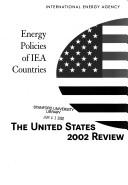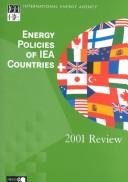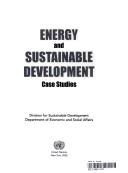| Listing 1 - 5 of 5 |
Sort by
|

ISBN: 128003579X 9786610035793 9264191976 9264197621 Year: 2002 Publisher: Paris : OECD Publishing,
Abstract | Keywords | Export | Availability | Bookmark
 Loading...
Loading...Choose an application
- Reference Manager
- EndNote
- RefWorks (Direct export to RefWorks)
The International Energy Agency's 2002 review of US energy policies and programmes. It finds that US energy policy has an influence on energy policy throughout the world. The 2001 National Energy Policy is an important development. The US is taking unilateral action as an alternative to the Kyoto Protocol. This report urges consideration of legislation on carbon dioxide and adoption of policies allowing international trading in emissions. Strengthening fuel economy standards is an encouraging approach to energy use in transport. Different standards for cars and light trucks should be addressed as a priority. Policies to promote new sources of energy supply should be balanced by continuing effort to enhance efficient use of energy. Regional Transmission Operators are a sensible means of ensuring access to transmission and the functioning of a competitive wholesale market. The power crisis in California has slowed progress on market reform; confidence should be restored to reactivate reform and to create certainty for new investment. Harmonised electricity industry standards and regulations could help promote competition and encourage investment. Barriers to exploration for oil and gas need to be addressed. Drilling in new onshore and offshore areas, meeting acceptable environmental standards, is necessary or imports must rise. Refineries are operating at full capacity; pressure could be eased by reducing the range of products they are required to produce to meet regional standards. Coal use will remain important and could be environmentally sustainable with advanced clean coal technology. Re-licensing of existing nuclear plants, consistent with safety standards, could ensure nuclear power plays a continuing role, even if new plants remain uneconomic. The decision on the Yucca Mountain repository will be important for the future of nuclear power worldwide.
Energy consumption. --- Energy policy. --- Power resources. --- Energy conservation --- Power resources --- Energy policy --- United States

ISBN: 9264196595 9786610035724 1280035722 9264195785 Year: 2002 Publisher: Paris : Organisation for Economic Co-operation and Development,
Abstract | Keywords | Export | Availability | Bookmark
 Loading...
Loading...Choose an application
- Reference Manager
- EndNote
- RefWorks (Direct export to RefWorks)
This volume contains an analysis of energy policy and energy market developments in Member countries of the International Energy Agency. Among its highlights are summaries of in-depth energy policy reviews of Australia, Belgium, the Czech Republic, New Zealand, Spain and Turkey which were conducted October 2000 to June 2001. The full reviews are published separately. It also includes short reviews of policy developments in Finland, Hungary, Ireland, Italy, Japan and Switzerland as well as energy balances and key statistical data for all Member countries and key energy statistics for the past 2
OECD countries --- Energy policy --- Reviews --- Energy conservation. --- Energy policy. --- Power resources.
Book
ISBN: 9289413506 Year: 2002 Publisher: Luxembourg Office des publications officielles des Communautés européennes
Abstract | Keywords | Export | Availability | Bookmark
 Loading...
Loading...Choose an application
- Reference Manager
- EndNote
- RefWorks (Direct export to RefWorks)
Energy policy --- Energy consumption --- Energy conservation --- Politique énergétique --- Energie --- Economies d'énergie --- Consommation --- Politique énergetique

ISBN: 9264196609 9786610035731 1280035730 9264195793 Year: 2002 Publisher: Paris : OECD Publishing,
Abstract | Keywords | Export | Availability | Bookmark
 Loading...
Loading...Choose an application
- Reference Manager
- EndNote
- RefWorks (Direct export to RefWorks)
The International Energy Agency's 2002 review of Turkey's energy policies and programmes. This edition finds that Turkey aspires to link the oil- and gas-rich Caspian area to Western markets. Several pipelines through Turkey are nearing completion. The projects could enhance diversity and security of supply in consuming countries. They could also relieve the environmental strain of heavy ship traffic through the Bosporus. Numerous attempts have been made to open Turkey’s energy markets to competition and to ensure that energy supply grows in step with population and demand. Turkey has made early and extensive use of build-own-operate and build-own-transfer schemes to promote investment in power-plant capacity. In the last two years, decisive progress has been made. The concept of privatisation was introduced into the Turkish constitution. Legislation was adopted in February 2001 to allow competition in the electricity market and to adapt Turkey’s legislation for European Union membership. A new Gas Market Law was adopted in May 2001, despite the macro-economic turmoil that Turkey has experienced since late 2000. These reforms must now be implemented. Turkey’s carbon emissions are growing rapidly. They will grow even faster if coal use quadrupled by 2020, as the government expects. Air pollution is also a significant problem. Turkey has not signed the United Nations’ Climate Convention. But the government aims to comply with the general provisions of the Convention and to exploit the country’s energy efficiency potential. These efforts should be reinforced.
OECD countries --- Energy policy --- Reviews --- Turkey --- Energy conservation -- Turkey. --- Energy consumption -- Turkey. --- Energy policy -- Turkey. --- Power resources -- Turkey.

ISBN: 9211045177 Year: 2002 Publisher: New York United Nations
Abstract | Keywords | Export | Availability | Bookmark
 Loading...
Loading...Choose an application
- Reference Manager
- EndNote
- RefWorks (Direct export to RefWorks)
Energy conservation --- Energy development --- Renewable energy sources. --- Alternate energy sources --- Alternative energy sources --- Energy sources, Renewable --- Sustainable energy sources --- Power resources --- Renewable natural resources --- Agriculture and energy --- Energy resources development --- Energy source development --- Power resources development --- Conservation of energy resources --- Conservation of power resources --- Rational use of energy --- RUE (Rational use of energy) --- Conservation of natural resources --- Energy consumption --- Energy policy --- Recycling (Waste, etc.) --- Renewable energy sources
| Listing 1 - 5 of 5 |
Sort by
|

 Search
Search Feedback
Feedback About
About Help
Help News
News